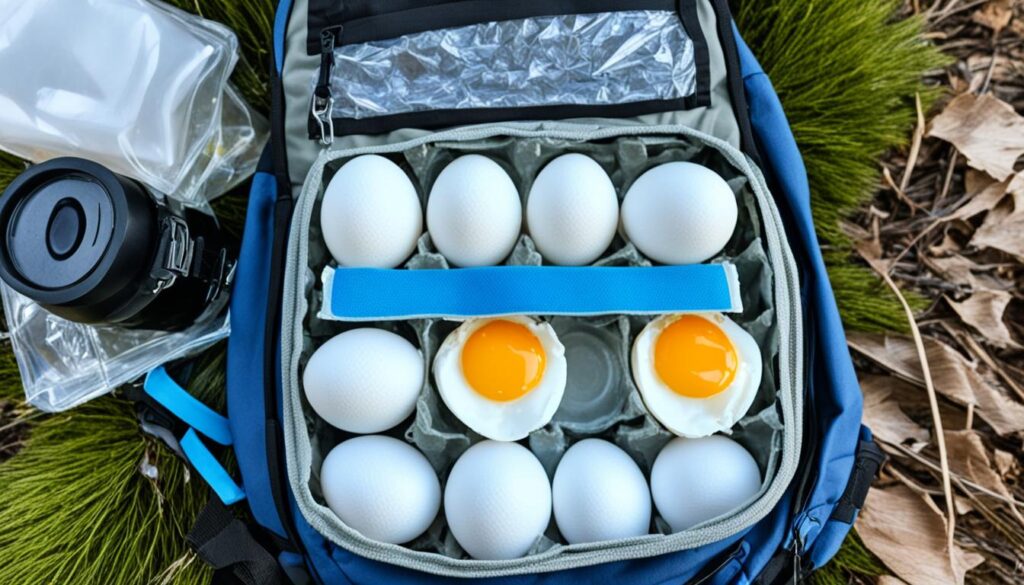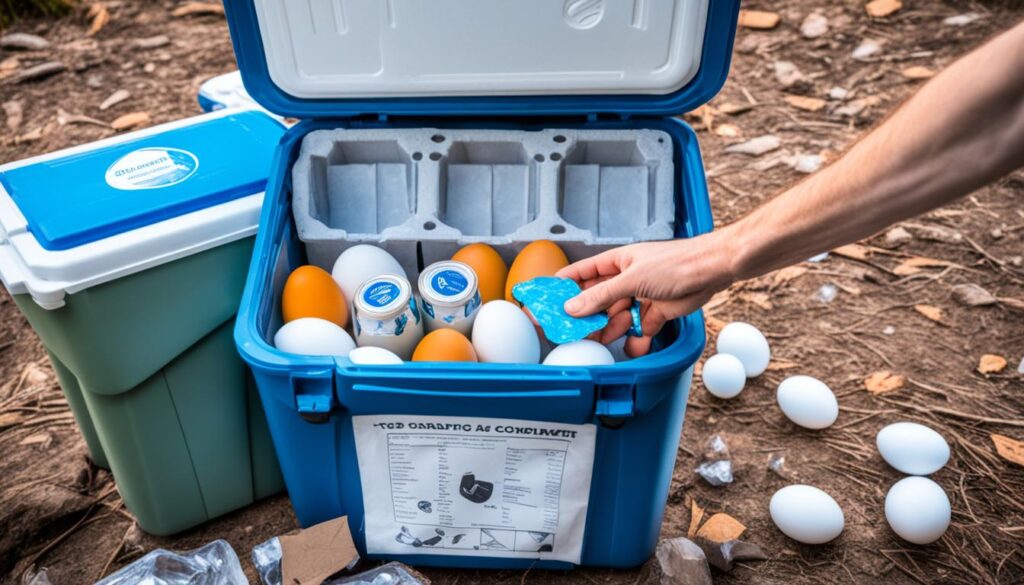When heading out on a camping trip, packing the right food is essential to ensure a satisfying and well-rounded outdoor experience. And for many campers, eggs are a staple breakfast item. However, transporting eggs without any mishaps can be a bit tricky. That’s why I’m here to provide you with some expert egg packing tips for camping, so you can enjoy a delicious and nutritious breakfast even in the great outdoors.
Key Takeaways:
- Choosing the right eggs is important when packing for camping.
- Using secure packing techniques can help prevent breakage.
- Proper storage and preparation ensure safe and delicious eggs on your camping trip.
- Consider alternative options like powdered or dehydrated eggs if fresh eggs are not available.
- Don’t forget to follow hygiene practices and cook eggs thoroughly.
Understanding the Basics of Egg Packing for Camping
Before packing eggs for camping, it is important to understand the basics of egg handling and storage. By following these guidelines, you can ensure that your eggs stay intact and ready to be cooked on your camping trip.
- Selecting Fresh and Undamaged Eggs: Start by choosing eggs that are fresh and undamaged. Cracked or compromised eggs are more likely to spoil or break during transportation. Inspect each egg carefully before packing them.
- Choosing the Right Packing Method: When it comes to egg packing methods, there are several options to consider. One popular method is using an egg carton for added protection. Simply place the eggs snugly in the carton and close the lid securely. Another option is using a specially designed egg container, which provides even more protection for your eggs.
- Storing Eggs in a Cool and Dry Place: It is crucial to store eggs in a cool and dry place during transport to prevent spoilage. If you are camping in warm weather, consider packing your eggs in a cooler with ice to maintain a consistent and cool temperature. Alternatively, you can use an insulated bag to protect the eggs from temperature fluctuations.
By keeping these basic egg packing tips in mind, you can ensure that your eggs remain secure and ready to use during your camping adventures.

Now that you understand the basics of egg packing for camping, let’s move on to explore the different types of eggs suitable for camping and how to choose the right ones.
Choosing the Right Eggs for Camping
When it comes to packing eggs for camping, making the right choice can make all the difference. There are various options available, each with its own advantages and disadvantages. Taking into consideration factors such as shelf life, flavor, and convenience will help you select the eggs that best suit your camping trip.
Fresh Eggs
If you have access to fresh eggs, they can be an excellent choice for camping. Fresh eggs offer superior taste and texture, making them ideal for cooking on the campfire. However, they require careful handling and should be packed securely to prevent breakage. Additionally, keep in mind that fresh eggs have a relatively short shelf life and need to be kept refrigerated.
Powdered Eggs
Powdered eggs are a lightweight and convenient option for camping. They are dehydrated eggs that can be reconstituted by adding water. These eggs have a longer shelf life and are easy to pack, making them popular among campers. While they may not offer the same taste and texture as fresh eggs, they are a practical choice for outdoor trips.
Dehydrated Eggs
Similar to powdered eggs, dehydrated eggs are another lightweight and convenient option. They are eggs that have been dehydrated to remove moisture, resulting in a lightweight product that can be rehydrated when needed. Dehydrated eggs have a longer shelf life and are easy to pack, making them a practical choice for camping. However, like powdered eggs, they may not deliver the same taste and texture as fresh eggs.
Store-bought Eggs
If fresh eggs are not available or convenient for your camping trip, store-bought eggs can be a suitable alternative. These eggs have a longer shelf life and are usually pre-pasteurized, ensuring food safety. Store-bought eggs come in various forms, such as liquid eggs, egg whites, or whole eggs. They offer convenience and can be easily packed for outdoor adventures.
Consider your camping needs and preferences when selecting the eggs for your trip. Whether you choose fresh eggs, powdered eggs, dehydrated eggs, or store-bought eggs, each option has its own unique benefits. Ensure you pack and store them properly to keep them safe and enjoyable throughout your camping adventure.

| Fresh Eggs | Powdered Eggs | Dehydrated Eggs | Store-bought Eggs | |
|---|---|---|---|---|
| Taste and Texture | Superior taste and texture. | May not offer the same taste and texture as fresh eggs. | May not offer the same taste and texture as fresh eggs. | Varies depending on the form (liquid eggs, egg whites, or whole eggs). |
| Shelf Life | Relatively short shelf life, requiring refrigeration. | Long shelf life. | Long shelf life. | Long shelf life. |
| Convenience | Requires careful handling and secure packing. | Lightweight and easy to pack. | Lightweight and easy to pack. | Convenient and easily packed. |
Packing Techniques for Eggs while Camping
When it comes to packing eggs for your camping trip, there are various techniques you can utilize to ensure their safe transportation and prevent any unwanted breakages. Here are some practical and DIY egg packing methods for camping:
- Using an Egg Carton: One of the simplest and most convenient ways to pack eggs for camping is by using an egg carton. This helps to securely hold each individual egg in place and prevent them from moving around or colliding with other camping supplies in your cooler or backpack.
- Investing in a Specially Designed Egg Container: If you are a frequent camper, you may consider purchasing a specially designed egg container that is specifically made for transporting eggs during outdoor trips. These containers often have individual compartments that provide excellent protection and prevent eggs from cracking during transportation.
- Wrapping Eggs in Bubble Wrap: For campers looking for a cost-effective DIY solution, wrapping each egg individually in bubble wrap can be an effective method to prevent breakages. The cushioning provided by the bubble wrap acts as a protective layer and absorbs any impact or shocks that may occur during travel.
- Pre-Cracking Eggs into a Container: Another option is to crack and store your eggs in a suitable container before heading out on your camping adventure. This eliminates the risk of accidental breakages and allows you to pack the eggs in a more compact and space-saving manner.
- Hard-Boiling Eggs: If you prefer to have cooked eggs while camping, hard-boiling them before your trip is an excellent option. Hard-boiled eggs are less prone to cracking and can be stored without any additional packaging. Plus, they make for a convenient and protein-packed snack on the go!
These different packing techniques offer practical solutions for ensuring your eggs stay intact and ready to be cooked during your camping excursion. Choose the method that best suits your needs and camping style.

A Comparison of Egg Packing Techniques for Camping
| Technique | Advantages | Suitability |
|---|---|---|
| Using an Egg Carton | Provides individual egg compartments for added protection | Suitable for campers with access to an egg carton |
| Specially Designed Egg Container | Offers dedicated compartments and secure storage for eggs | Perfect for frequent campers and outdoor enthusiasts |
| Wrapping Eggs in Bubble Wrap | Cost-effective and provides cushioning against impacts | Ideal for campers who prefer a DIY solution |
| Pre-Cracking Eggs into a Container | Eliminates risk of breakages and saves space | Convenient for those looking to maximize storage efficiency |
| Hard-Boiling Eggs | Reduces the risk of egg breakages during transport | Recommended for campers who prefer pre-cooked eggs |
Storing and Preparing Eggs for Camping
Properly storing and preparing eggs for camping is vital to ensure food safety. When it comes to storing eggs, it’s important to keep them in a cool and dry place. Consider using a cooler with ice or an insulated bag to maintain the eggs’ freshness and prevent them from spoiling. By taking these precautions, you can keep your eggs safe and ready for cooking during your camping adventure.
Preventing eggs from breaking during storage is crucial. To achieve this, you can use various egg storage ideas for camping. Some options include cushioning them with towels, placing them in plastic containers with tight lids, or using egg holders specifically designed for outdoor trips. These hacks will help protect your eggs from any accidental impacts during transportation, allowing you to enjoy them intact at your campsite.
When it comes to preparing eggs for consumption on your camping trip, the possibilities are endless. Popular options include scrambled eggs, fried eggs, omelets, and egg salad. By following proper hygiene practices, such as washing your hands before handling eggs, you can ensure their safety for consumption. Additionally, cooking eggs thoroughly will eliminate any potential bacteria, maximizing both their safety and deliciousness on your camping adventure.
FAQ
What are some basic guidelines for packing eggs for camping?
When packing eggs for camping, it is important to choose fresh and undamaged eggs, use secure packing methods to prevent breakage, and store them in a cool and dry place during transport.
What options do I have for packing eggs for camping?
You can choose between fresh eggs, powdered eggs, dehydrated eggs, or store-bought eggs. Each option has its own advantages and suitability for different camping situations.
What are some popular methods for packing eggs for camping?
Popular methods include using an egg carton or a specially designed egg container, wrapping eggs in bubble wrap, pre-cracking eggs into a container, or hard-boiling them before the trip. The best method depends on your specific needs and the level of protection you require for your eggs.
How should I store and prepare eggs for camping?
Eggs should be stored in a cool and dry place, either in a cooler with ice or an insulated bag. To prepare eggs for consumption, options include scrambled eggs, fried eggs, omelets, and egg salad. It is important to follow proper hygiene practices and thoroughly cook eggs to ensure their safety and deliciousness on your camping trip.

